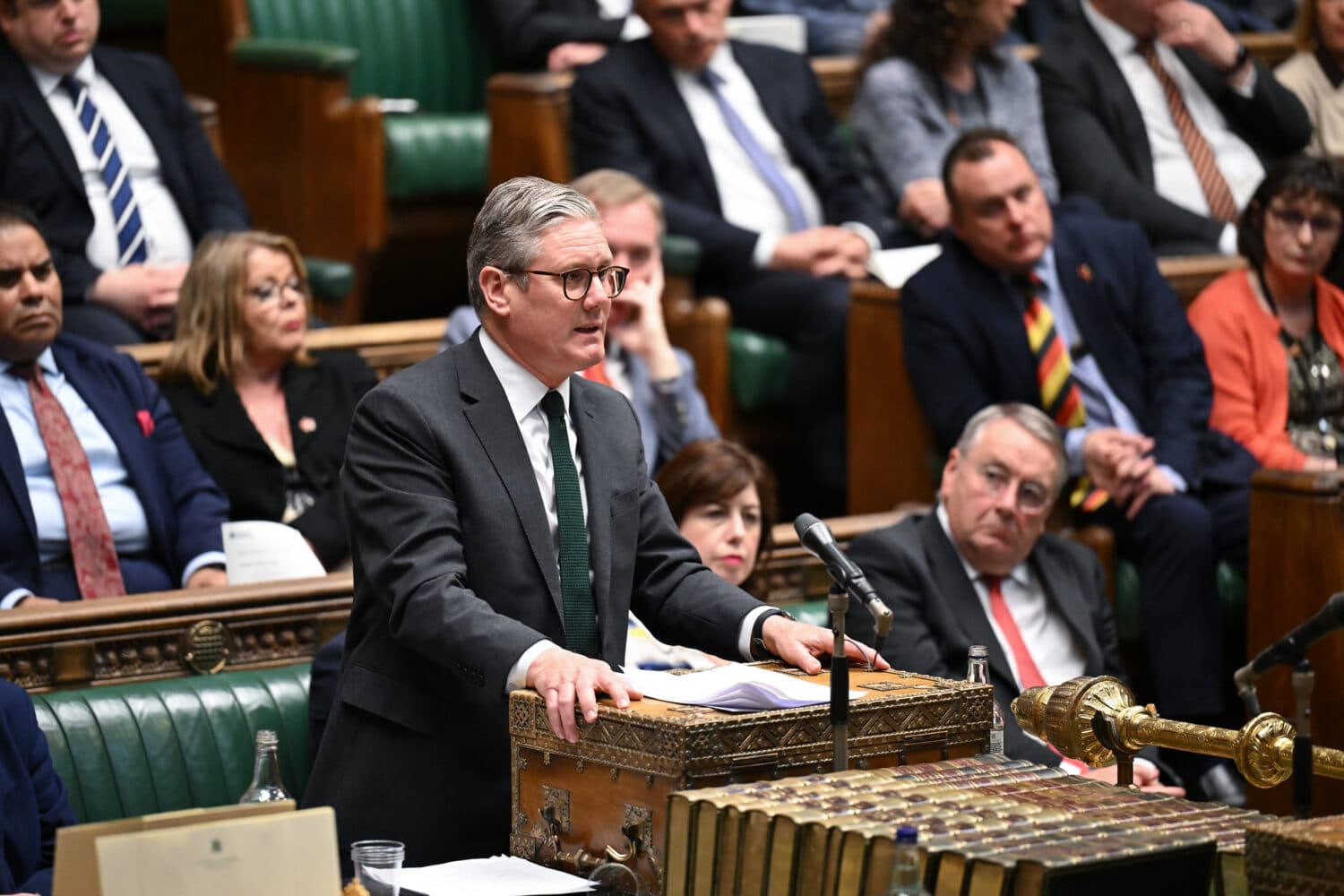The Fabian Manifesto
With a general election finally in sight, Andrew Harrop outlines a Fabian programme for government
Find the manifesto here. Or, read the web version below.
The July 2024 general election offers a generation-defining choice: chaos, division and decline with the Conservatives; or hope, security and national renewal with Labour.
To coincide with this critical political moment, the Fabian manifesto presents some of the key policy ideas the Fabian Society has developed in recent years to help shape the future of the left. Together they are a source of inspiration for a future government intent on making Britain fairer, greener and more successful.
Note: as with all Fabian Society publications this manifesto represents the views of the author only. The Fabian Society does not have collective positions. Members of the Fabian Society including those serving on our executive committee do not necessarily agree with the contents.
Defining success
Two ambitions:
The task of government for the next decade should be to deliver ‘good growth’ and ‘good society’:
- Good growth means significantly and sustainably increasing living standards for everyone, while making rapid progress towards net zero carbon emissions.
- Good society means transforming the UK into a country that is much healthier, better educated, safer, greener, more caring and nurturing, and more fair, equal, resilient and united.
Ten 10-year goals:
The next government should set itself TEN goals that it will seek to achieve over 10 years. They reflect the key challenges facing the UK and are relevant both to the country as a whole and to individual families.
Good growth
- Declining carbon emissions – emissions below one quarter of 1990 levels and net zero electricity.
- Rising living standards – household incomes rising in line with the post-1945 average and catching up with other rich nations.
- Narrowing regional inequality – a measurable fall in geographic gaps in economic output, earnings and household incomes.
- Falling poverty – ending destitution and halving the proportion of people living in poverty
- More affordable housing – a fall in rents and house prices relative to earnings and a million more homes for subsidised rent.
Good society
- Better health – healthy life expectancy rising in line with the post-1945 average, health inequalities narrowing, better mental health and wellbeing, and restored confidence in the NHS.
- Better education – a rise in the number of young people and adults acquiring qualifications at every level and much narrower socioeconomic attainment gaps.
- A safer nation – less crime, less fear of crime, less vulnerability to cyber and security threats, and greater confidence in the police and justice system.
- More caring and nurturing communities – more support and time together for families; high quality, affordable childcare and social care that meets levels of need.
- Greater fairness and equality – a fall in inequalities in income, wealth and power; greater social mobility; and institutions built on integrity, openness, fairness and respect.
Key policy proposals
Arts and culture
- Create a National Music Education Service with a free instrument loan for every child.
- Reinvent libraries to serve as hubs for digital media and culture.
- Require all beneficiaries of creative industries tax reliefs to pay a small percentage of this money into a fund to support future creative talent.
Consumers
- Announce a ‘cost-cutting plan’ to stop rip-offs in essential markets such as ‘loyalty premiums’.
- Improve social tariffs across energy, water and digital connectivity; and work towards awarding these automatically by matching benefits data.
- Offer free refurbished devices and basic technology training to everyone who is digitally excluded.
Climate resilience
- Introduce a maximum temperature for workplaces, a duty for landlords to prevent rented homes from overheating, and a duty for councils to provide accommodation to rough sleepers during extreme weather events.
- Strengthen climate resilience requirements for infrastructure providers and invest in developing and maintaining flood defences to protect more homes from flooding.
- Strengthen planning requirements relating to climate resilience and retrofit homes to prevent heat and drought related risks as well as lower carbon emissions.
Education and skills
- Build universal, open-access early years services particularly targeting disadvantaged children, including more frequent health and development checks.
- Broaden and modernise the school curriculum , including by placing the arts at the heart of education.
- Reform student finance so that low-income students can afford to study and UK universities can thrive.
- Build an integrated adult skills system with an offer for every business and worker, based on a national skills portal and devolution of training and job centre support.
Economy
- Create a new cabinet committee, an expert commission and a leadership council (including devolved leaders, businesses and unions) for productivity growth, industrial strategy and regional development.
- Develop a new mandate for the Bank of England where it can recommend fiscal intervention by the Treasury if it judges that rate setting is insufficient to prevent stagnation or high inflation.
- Reform planning to get Britain building with a presumption in favour of green energy and a faster, more certain regime for approving infrastructure.
European Union
- Establish a UK/EU security and foreign policy council.
- Negotiate a deeper economic partnership with fewer trade barriers and more personal mobility.
- After five years, reassess the case for joining the EU customs union.
English devolution
- Allow every part of England to move towards the level of devolution currently available to Greater Manchester and the West Midlands.
- Establish devolved economic budgets across England based on fair financial allocations rather than bids and deals.
- Create powers to raise local revenues with targeted levies such as additional council tax on second homes, workplace parking levies, visitor levies and land value capture.
Equality and human rights
- Examine the case for incorporating international social, economic and cultural human rights into domestic law – eg rights to food, shelter, independence for disabled people.
- Consider making ‘carer status’ a protected characteristic under equality law.
- Require public bodies to tackle inequality with respect to socioeconomic background.
Future of work
- Strengthen trade union rights and sectoral collective bargaining, starting with a Fair Pay Agreement for adult social care.
- Clarify the definition of self-employment and improve rights and protections for non-employees.
- Strengthen rights to sick leave, carer’s leave and parenting leave, with the long-term aim of creating earnings-related employment insurance.
Health and social care
- Create a National Care Service as a partnership between national government, councils and care providers, offering help to everyone who needs assistance with fair funding, new rights and nationwide terms and conditions for care workers.
- Prioritise closing health inequalities in every part of government and introduce stronger regulations relating to obesity, smoking and alcohol.
- Build people-centred healthcare where the NHS supports individuals and communities to manage and improve their health, treating them as experts and collaborators.
Housing
- Require that at least one third of new homes are affordable tenures, fund capital grants to build 90,000 social homes per year, and permit councils to purchase private rented homes for social housing.
- Approve new communities on well-connected green belt, while improving access to nature and green spaces.
- Change planning rules to give developers more certainty, while requiring that new homes are low carbon, adaptable and offer sufficient space.
Justice
- Reform civil legal aid with a focus on advice, early resolution and effective access to justice.
- Review sentencing and rehabilitation to reduce prisoner numbers and reoffending.
Migration
- Cooperate with other countries to reduce undocumented migration and create safe and legal routes to asylum in the UK.
- Build a migration system for workers and students based on UK economic needs with clear expectations regarding integration and pathways to citizenship.
Pensions
- Reform private pensions to achieve: higher minimum employer pension contributions; opt-out pension saving for all workers including the self-employed; stronger employer expectations beyond the legal minimum; automatic conversion of pension savings into lifelong retirement incomes.
- Increase pension schemes’ investment in UK growth by encouraging consolidation, reviewing regulation and creating investment vehicles.
- Raise benefits to match the level of pension credit for people with a low income who are in their mid-60s and unable to work.
Public finance
- Create an Office for Value for Money to advise on effective spending.
- Improve the conduct of spending reviews, with a focus on public services, taxes and benefits over at least five years.
- Make better capital expenditure decisions based on expert appraisals, long-term consistency and more flexible fiscal rules.
- Build long-termism and prevention into how all spending decisions are made across government.
- Reform local government finance so councils can fairly meet local needs; and introduce improved local audit and accountability.
Public services
Reform public services to achieve:
- Stronger public character and ethos, with a presumption in favour of public or non-profit delivery.
- Devolution of trust and power to places, institutions, frontline employees and citizens.
- Greater performance and value through data and technology, peer-led improvement, early intervention and joined-up provision.
Social security
- Tackle destitution by reforming universal credit to end the two-child limit, the benefit cap, the five week wait, unfair sanctions and unmanageable repayments.
- Permanently link all annual benefit increases either to the ‘triple local’ or to earnings; also link local housing allowance to local rents.
- Establish a living standards commission to advise the government on minimum income adequacy thresholds, and strategies for fighting poverty, raising living standards and reforming social security.
Taxation
- Examine all loopholes and tax reliefs – eg inheritance tax rules, pension tax relief.
- Consider reforming taxes on property, assets, businesses and non-employee income – starting with reform of council tax.
- Debate earmarked taxes for health and social care – eg a visible portion of income tax and VAT.
Transport
- Introduce bus franchising in every part of England.
- Devolve more power over rail to city regions and sub-national bodies like Transport for the North.
- Examine the case for road pricing as a long-term successor to fuel duty.
Reforms that won’t cost the taxpayer
Progress on some issues will depend on the economy growing fast enough to generate the necessary new revenues. But in other areas it depends on government regulation, coordination and direction much more than public spending.
Here are 20 actions a cash-strapped government could take with little or no new money:
- Automatic social tariffs for energy and broadband
- Bus regulation and local franchising
- Clearing the asylum backlog and enabling more applicants to work
- A closer economic relationship with the European Union
- Consumer protection and competition reforms
- Decent sick pay, paid for by employers
- A democratic second chamber
- Devolution in England and more powers for Scotland and Wales
- Ending restrictions to onshore wind and solar power
- Expanding workplace pension contributions and eligibility
- Low emission zones, congestion schemes and road pricing
- National living wage increases
- Planning and land compensation reform
- New public health regulations targeting obesity, tobacco and alcohol
- Restored trade union rights and expanded collective bargaining
- School curriculum and assessment reform
- Sentencing and rehabilitation reform
- Strengthened tenant rights and protections
- Facilitating long-term private investment in infrastructure and housing
- A zero-carbon requirement for new buildings
Image credit: UK Parliament via Flickr

